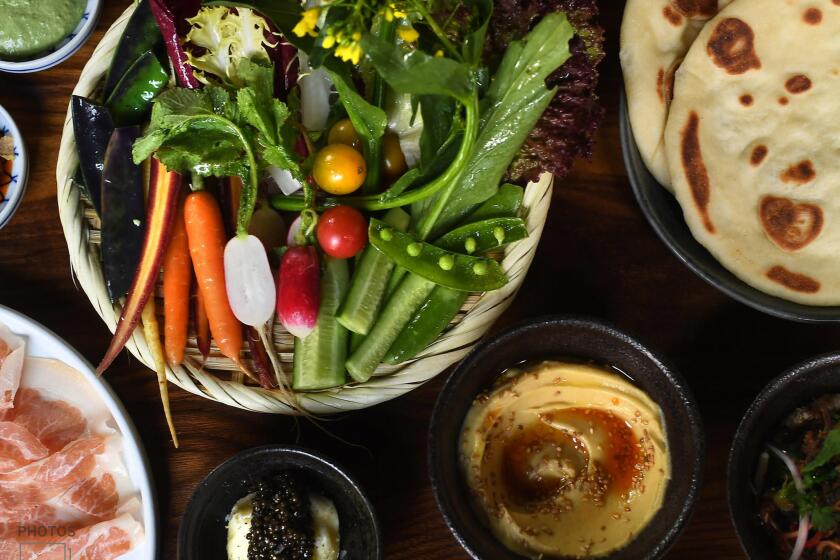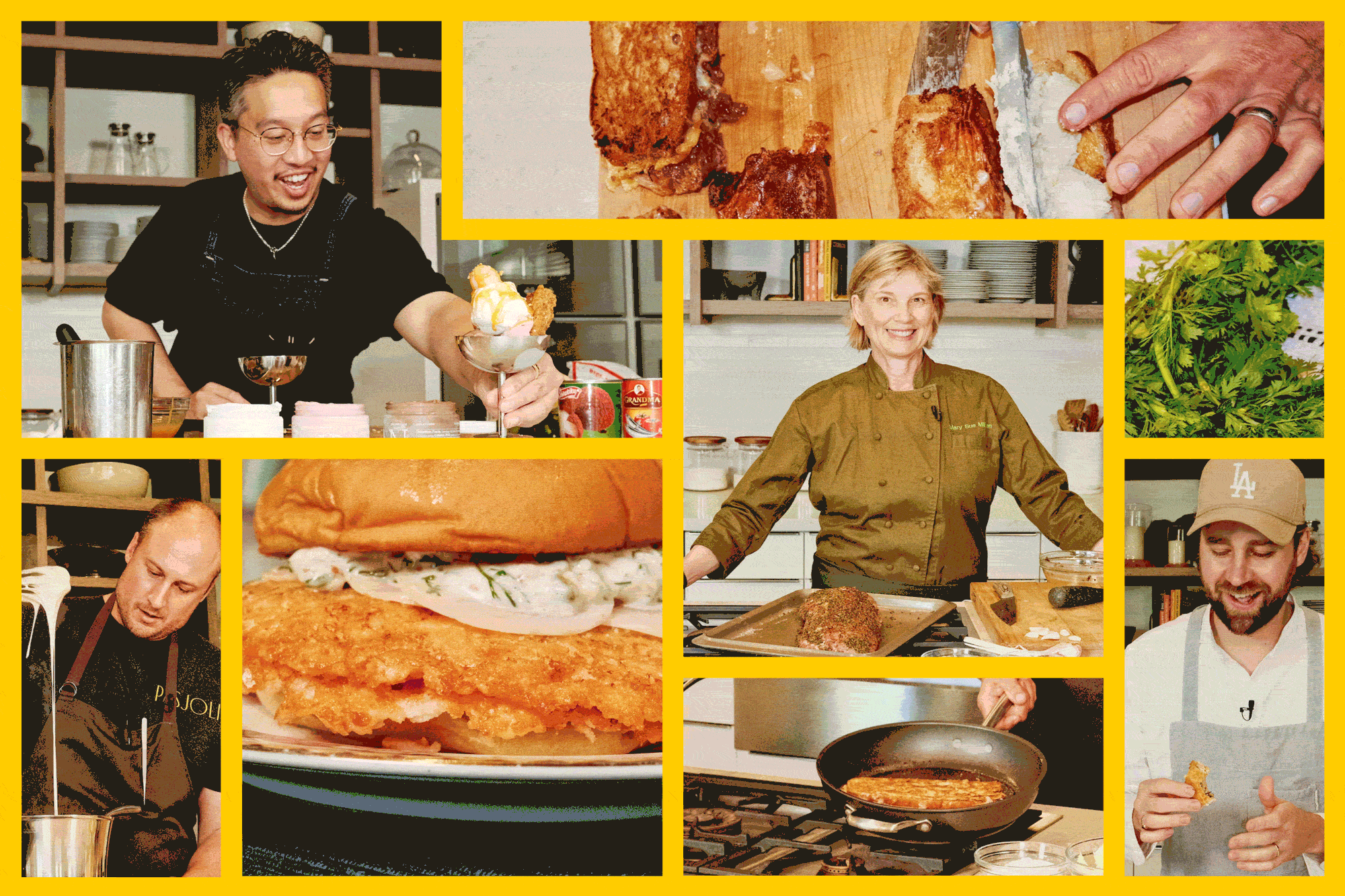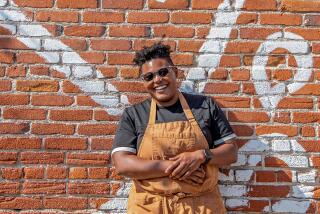David Chang doesn’t want your compliments
- Share via
“He really does smoke a joint every hour,” David Chang laughs, referring to Seth Rogen, after pouring the au jus.
The Momofuku chef, restaurateur and TV host would know: He spent a day in Vancouver, British Columbia, getting high and eating well with the Canadian actor for his latest Netflix series, “Breakfast, Lunch & Dinner.”
Whether at his Los Angeles outpost, Majordomo, for a seven-course celebration of the new program’s launch, or by phone the next day before heading back to New York, Chang, 42, is more circumspect than his reputation might suggest: Once regarded as the irreverent hothead who helped remake fine dining through ramen and steamed buns, the Korean American wunderkind — and new father — seems to have mellowed, embracing both the expansion of his empire and criticism of his approach. (The newest star in Chang’s constellation, Majordomo Meat and Fish, is slated to open at the Venetian hotel in Las Vegas, “coinciding with Thanksgiving or Christmas,” he says.) If there is one central theme that resounds through our conversation, it is his yearning for self-improvement.
Good thing too. “Breakfast, Lunch & Dinner,” Chang’s follow-up to last year’s acclaimed “Ugly Delicious” (both produced in partnership with Oscar-winning documentarian Morgan Neville’s shingle, Tremolo Productions), has been called “a bland celebrity food tour” caught up in “the appetite-driven fog of contemplation” and intermittently guilty of “cultural stereotypes and exoticism.” The series, though branded as part of the “Ugly Delicious” universe, is distinctly less food-centric than its predecessor, in which each episode riffs on multiple cultures’ versions of the same dish (tacos, for example, or fried chicken). Here, as Chang puts it, food is simply the “icebreaker”: “Breakfast, Lunch & Dinner” uses cuisine to draw out the personalities of four celebrities — Seth Rogen, Chrissy Teigen, Lena Waithe, Kate McKinnon — and four cities — Vancouver, Canada; Marrakech, Morocco; Los Angeles; Phnom Penh, Cambodia — with Chang as the emcee game for anything.
(Well, except durian fruit. That’s a bridge too far.)
The Times spoke with Chang about reading bad reviews, managing expectations, allowing for failure and the fate of “Ugly Delicious” — which both its host and Brandon Riegg, Netflix’s vice president of unscripted originals, confirm is coming back for a second season “soon.”
That fuming, blackened haunch of meat you see on half the tables at the new Majordomo — that’s the whole plate short rib, a massive cut rubbed with spices, slapped into a smoker for the better part of a day, carved into elegant slices tableside, and served with enough fermented Korean sauces, herbs and wrappers to feed four starving carnivores.
How did you come up with the concept for “Breakfast, Lunch & Dinner,” and what was the thought process behind branding it as an offshoot of “Ugly Delicious”?
The idea was hatched by so many different people who were working on the project — from Tremolo, Majordomo Media and the team at Netflix — as to what else we could explore in the universe that is “Ugly Delicious.” After editing and talking to Morgan and everyone, there was so much footage that we had from “Ugly Delicious,” from the interviews, that never really could make it into an “Ugly Delicious” episode. ... No one person came up with it. It was a mutual idea of, “Let’s experiment. Let’s see how this might look if we did more of the conversations and less of the discovery of the specific food.”
How did you end up landing on these four guests? Were there criteria for “This is the kind of person we would want to talk to”?
I don’t know if being “agnostic” is the right word, but that was it. It was just like, “Who are four people that I really like or want to know more about or would like to hang out with, and who I imagine would have some version of themselves that maybe hasn’t been revealed to people?” We didn’t know. We were just venturing to see if it was going to work. This is not my full-time job, and I’m learning to be a better interviewer. It was very nerve-wracking for me, because we’re going to a place that I wasn’t the expert in — I don’t even want to use the word “expert”; sometimes where I’d never been before — and how do we have someone that we could imagine a good conversation taking place?
One of the things that was really ambitious about “Ugly Delicious” was the structuring element: taking an item of food and digging deep into its various iterations. What are the challenges and advantages of leaning more in the direction of an interview format?
Not to be so self-referential, but the only thing I could draw upon when talking about this whole thing was, within our restaurants, we have dessert bars, chicken sandwiches, $6 Korean shawarma type of things, noodle bars, tasting menus. How do you get that all aligned? I look at these things that we have at Momofuku, and to me they’re on the same sort of goal — they’re just different avenues to get there. The team at Ko have different challenges than the the team at Bāng Bar ... I don’t think there’s anything easy about either show, but it was a different kind of rabbit hole with “Breakfast, Lunch & Dinner,” and also it was sort of unknown. One of the things that’s not easy, but linear about “Ugly Delicious” is knowing where things are gonna go. You sort of have a game plan, even though there’s constant data that’s changing and we weave and zig and zag wherever — but we sort of have an idea. We didn’t really have that at all on “Breakfast, Lunch & Dinner.” And it was hard for me.
Is there anything about interviewing that you learned on “Breakfast, Lunch & Dinner” that you’ll take forward?
I think the biggest thing that I was trying to figure out — both as a chef and for this show — was being way more aware of when to actually talk about something and when to shut the ... up and just listen. [H]ow to shape a conversation so it doesn’t go to a dead end.
Do you ever read reviews, either of your restaurants or your television shows?
Yeah. I’d be lying if I didn’t say that. Particularly for restaurants. The restaurant review versus the TV review is very different, though. So different. I don’t even know how to think about it. It’s surreal.
My take on the reviews of “Ugly Delicious” was that the reviews were pretty effusive. What was your reaction to that?
I tend to only focus on the things that are negative. Things that we could do better. That’s just my own neuroses. When I worked for Daniel Boulud, the whole idea of praise in the kitchen, praise is the absence of criticism. Praise is the absence of criticism. I’ve actually turned that into, The only thing that I really want is criticism. It’s weird. And it’s something that, from my restaurant-chef perspective, I’ve learned to — and am trying to get better at — not let that affect what you’re trying to do. Having read [reviews of “Ugly Delicious”], most of it — I would say the [large] majority of it — was mostly positive. I do think that there are ways to make things better, and we wanted to have an opportunity to explore how to make things better, however slight they may seem.
What was one thing that you felt like you needed to improve [for Season 2 of “Ugly Delicious”], and what did you do to improve it?
One of the things that was a common complaint was, it’s too bro-y. That’s not something we wanted anyone to feel. However small that criticism might be, we don’t want people to feel like they were left out, and that was something we tried to do better.
Whether conscious or not, it seems to me that may have inflected who you ended up going to for “Breakfast, Lunch & Dinner.”
We never thought we were doing it intentionally. We wanted to do what was right. We weren’t thinking about anything but, “Who do you think is going to be the best guest?”
If there were going to be another season of “Breakfast, Lunch & Dinner,” what is one thing you would want to do differently?
I’m not sure. I need time to reflect on that and time to talk to Morgan and the team. It’s a strange place to be, because we tried to do something that was different but in the same wheelhouse as “Ugly Delicious.” I could certainly see, like, we could have done a whole series on just staying in Cambodia. The way things are framed, it’s hard — and what I would like to get better at is how to go deeper into [some] subjects and not [into others]. I don’t have that idea of what that actually looks like yet. ... We have the luxury, and the opportunity, to talk about these things in multiple perspectives. And just because one show doesn’t talk about one, the other one might. I think what I would like to be better at is to convey that is always our goal: to get as many perspectives as possible.
Did you have a favorite thing that you ate in your travels for “Breakfast, Lunch & Dinner”?
The fruit in Cambodia as a whole, from the rambutans to the mangosteens, was pretty — I hate to use the word “life-changing,” but it was like, “Wow, I’ve never had this [as good as this].” ... On a pure ingredient level, that would be it. Freshwater prawns, I didn’t know could ever be that big. And also just the breakfast noodles in general were delicious. That’s the thing that I was surprised to learn about, that there’s a definitive distinction between [Cambodian cuisine] and the foods of its neighbors.
The tajine we ate at Tarik [Amar]’s home in Marrakech, when I said it was perfect, it was pretty ... perfect in terms of acidity and the salt and the spice level. And the couscous was delicious. And to be able to eat that in the home was tremendous. Not a lot of people get to go to Marrakech and have that meal unless you know someone that lives there.
Gardena Bowl too. That’s a place that I had not eaten before, and I love the fact that it’s an icon in Asian American food. Even though the hands of ownership have changed. Any menu that has chicken teriyaki to Filipino oxtail stew to basically nacho fries to the smothered royale, which left such an impression that we tried to put a version of that at one of our new restaurants. You ask me on the day and I’d give you a different answer every time. Honestly, that doughnut that we had with Seth, I’ve never had a hot jelly doughnut in my life, and I was genuinely perplexed as to why I’d never had that before.
I’m curious. I know you’re writing about it, but what did you think of the show?
I loved “Ugly Delicious,” as someone who’s a little bit of a food nerd, going in depth into the various iterations of a dish and breaking down the notion of authenticity ... For “Breakfast, Lunch & Dinner,” maybe my unfair expectation was that it would be the same. Was there any frustration earlier in your career when you felt like people would expect more of the same?
I’ve dealt with that all the time. It’s a good problem to have, but it’s a problem nonetheless. We do our best. We try to hold ourselves to that standard, and I certainly think that “Ugly Delicious,” as you say, is something that is jam-packed with a lot of information. And it’s something we’re incredibly proud of. But that’s the thing... It’s a good comparison to the variety of restaurants. It’s something that people have an idea of and expect a certain quality, and we’re all really proud of “Breakfast, Lunch & Dinner” knowing full well that if people are expecting it to be exactly like “Ugly Delicious,” or certain other kinds of shows — we can only control so much. If we didn’t have “Ugly Delicious,” I don’t think we would have done what we did with “Breakfast, Lunch & Dinner.” It’s two sides of the same coin. While that’s not exactly true, that’s sort of how we looked at it.
The thing about “Ugly Delicious” is, I hadn’t seen anything like it before. Whereas I feel like “Breakfast, Lunch & Dinner” — interview shows are more common. Even shows where the host and a guest travel to a far-off locale. I obviously thought of [Anthony] Bourdain, but others have done it as well. I think because it’s more familiar, it sets the bar higher.
I will tell you that one of the things that we try to do when we build food concepts is [acknowledge] that it’s not for everyone. What someone may like about “Ugly Delicious,” they may not like in “Breakfast, Lunch & Dinner.” And what someone may like in “Breakfast, Lunch & Dinner,” they may not like in “Ugly Delicious.” That is one way to look at it. Alternatively, someone that may be open traditionally to something like “Breakfast, Lunch & Dinner” may not have looked at some of the issues we touch upon in “Ugly Delicious,” and it allows us to cast a wider net.
Thematically, the through line in both is the question of authenticity. In “Ugly Delicious,” it’s about what is authentic in terms of cuisine, and in “Breakfast, Lunch & Dinner,” you expanded that almost to ask, “What does it mean to be an authentic person?”
To me, it was always about discovery. To be able to be honest enough to look like an imbecile when proven wrong or shown a perspective that you didn’t realize. At the end of the day, what is so important about the shows for me, personally, is that it’s a journey to increase your empathy, as far-fetched and stupid as that might sound. How do you present something where some perspective or held belief prevented you from seeing another angle? ... Whether we were successful or not, our goal was that sense of travel. When you’re in a place, whether it’s foreign or familiar to you, it’s the one thing that allows you to feel like you have common ground. In the same way that you like the taco episode [of “Ugly Delicious”], if you eat a delicious taco, it should open up your eyes to realize, “We’re all the same. We all want the same.” And if someone that you watch and admire has the same insecurities, the same feelings about being someplace — whether it’s a guest or myself — part of that is just to realize we have the same problems. In my mind, it was never really to do a show like, “Hey, look at these well-known people.” If anything, it was the same goal that we were going for with “Ugly Delicious”: “This is a taco. This is a piece of pizza. This is a piece of fried chicken. You may have always eaten it this way, or thought about it this way, and it’s quite possible that by watching this episode, it may challenge some of your beliefs.”
I appreciate the humility it takes to be the host of the show and also be willing to admit that there are limits to your knowledge and understanding of the subject matter.
I’m an imbecile. And here’s the thing: Even on “Ugly Delicious,” we could have edited out a lot of these things where I just look like a dumbass. It’s important to me to tell people, “I’m a professional chef, and you think that I should like all these things that chefs are supposed to like.” I don’t like durian. I’m sorry. ... Or like the chicken feet, with Seth. I don’t like chicken feet. I’m not trying to say that it’s bad. I haven’t gotten to a point where I’m comfortable eating it. It’s not like I won’t eat it, but it’s not something I want to eat. We could have edited that out and made it pretty clean-cut. This is who I am.
I’ve never been in this situation before, man. It’s weird. For me, right now, I’m like, “[Expletive].” If someone that watches TV is asking these questions, it’s like, “How do we do this better?” Or I’m wondering, “Why did we leave some of this stuff in if it’s not obvious?” It’s not supposed to be perfect. But what needs to be perfect is the process that things moving forward are going to be better than what we did before. At least the attempt is.
No one is perfect at it every time out. The more important thing, in terms of what makes for good television, is trying a lot of different things and taking risks. And I appreciate you taking risks, even if I don’t think every decision always worked.
I just have to make mistakes. I want to get better. ... I don’t know if it’s my own neuroses, but that’s just how I have to be. As painful and stupid as that might be. I don’t take it for granted to have this opportunity to do this show in the wake of Tony [Bourdain] passing and me being an Asian American. I’m the last person in the world that would ever think, or my friends would think, to have this opportunity. We are striving to be the best. We want to do the most excellent work. We’re encouraging failure. We’re totally OK with it even though it sucks and it hurts. We’d rather fail than do stuff that’s going to try to be in the middle.
‘Breakfast, Lunch & Dinner’
Where: Netflix
When: Any time
Rating: TV-MA (may be unsuitable for children under age 17)
More to Read
The complete guide to home viewing
Get Screen Gab for everything about the TV shows and streaming movies everyone’s talking about.
You may occasionally receive promotional content from the Los Angeles Times.








